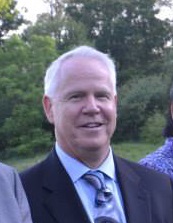This article is part of a series focusing on individuals who dedicate their careers to serving the public in honor of Public Service Recognition Week.

We asked Liam why he chose a career in this field and how his work in geospatial intelligence helps others.
What inspired you to pursue this career?
I was always fascinated by cartography and wanted to travel the Earth, mapping little-known areas of the world. After graduating with a bachelor’s degree in geography, I worked at the Defense Mapping Agency, which was the predecessor agency of the National Geospatial-Intelligence Agency.
For 16 years, I lived and worked in Latin America. I led mapping, charting and geodesy programs with partner nations Chile, Ecuador, Paraguay and Bolivia. I then moved to Manama, Bahrain, as a liaison to U.S. Naval Forces Central Command, where I opened the first NGA support office in Southwest Asia.
My career in earth sciences morphed into intelligence at the National Imagery and Mapping Agency (later renamed NGA). As the Director of the Office of the Americas at NGA, I led a team of analysts, staff and technical support personnel providing geospatial intelligence (GEOINT) analysis. We provided this information to policymakers as well as to those in the military and interagency charged with implementing policy, focusing on the national security concerns of counter-narcotics, homeland security, homeland defense, and Latin American political and military issues.
What do you wish you knew before going into this field?
Knowing more about interagency and military coordination and overlap, while conducting U.S. missions abroad, would have benefited me during my many years of living and working overseas.
What are the most satisfying and/or enjoyable part of your career?
The best part about my career was traveling the world. I lived in eight countries on four continents and visited another 40 countries. It was very satisfying to help foreign partner nations with mapping and geodesy. Later, I used geospatial intelligence to meet their security and humanitarian support needs.
Is there a moment or incident that you reflect upon fondly as being highly representative of why you pursued this career in the first place?
Providing humanitarian and security geospatial intelligence support during the Haiti earthquake disaster was a highlight of my career. (You can read about his role responding to that disaster in his article, Haiti Earthquake: the Role of Geospatial Intelligence During Response.)
What impact does your work have on American citizens?
The most important mission of the U.S. government is to provide a safe and secure environment for our citizens. People who work in geospatial intelligence help keep others safe. Their work includes providing support to our troops in war zones, helping with homeland security defense or building strong alliances with partner nations.
I see my entire career as providing small, incremental improvements to our nation’s safety and security. Those improvements include my current role as a professor, teaching the next generation of intelligence analysts.
What advice would you give others pursuing a similar career?
My mother gave me the best advice on careers; she received her Ph.D. at age 55, after raising eight children. She said, “Do what you enjoy.”
All professions are noble. Be confident in your abilities, and bold when conveying your abilities to others. And perhaps the best advice is to make lifelong learning a cornerstone of your life.

Comments are closed.